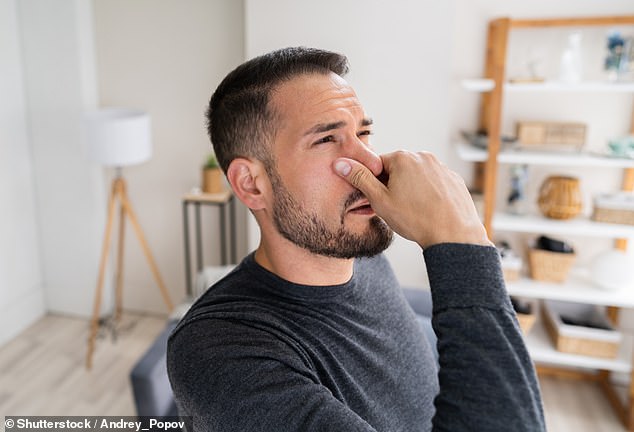Doctors FINALLY develop a treatment for loss of smell and taste caused by Covid
Doctors have developed a treatment for people whose senses of smell and taste have been distorted by Covid-19.
The 10-minute procedure involves a doctor injecting a steroid into a collection of nerves at the base of the neck, which kick-starts the nervous system.
Studies aren’t sure exactly how it works, but the treatment has been used to treat PTSD, migraines, and other circulatory problems.
In a study of 54 patients with persistent post-COVID parosmia, or impaired sense of smell, the injection provided them with some relief from their distorted sense of smell.
Doctors aren’t sure why exactly this procedure was so effective at regaining the sense of smell, but there is a prevailing hypothesis that injecting and numbing some of the sympathetic nerve tissue recalibrates the body’s nervous system to its pre-Covid state. Photo courtesy of Nevada Comprehensive Pain Center

You can’t walk past a bakery without gagging, the smell of onions makes you physically nauseous and even brushing your teeth is unbearable. It sounds unthinkable, yet that is the reality for tens of thousands of people with parosmia after contracting Covid
An estimated 20 million Americans are affected by a loss or distortion of their sense of taste or smell, often causing them to put off the foods and drinks they used to enjoy.
Doctors have found that people with Covid lose their sense of smell because the virus damages the receptor nerve endings or the supporting cells in their nose.
The odor-detecting nerve endings tell the brain how to interpret the chemical information that makes up an odor, and if they are damaged or if they do not heal properly, this can lead to parosmia.
Loss of taste and smell became more common earlier in the pandemic, when an estimated three in five patients had the symptom.
But vaccination and the spread of new variants are making symptoms less common.
The mechanism of action is largely unknown, but it is possible that blocking the nerve in the neck could change the way the brain interprets odors coming through the nose.
Parosmia, in which the damaged nerves try to regenerate but send confused messages to the brain, disrupting the sense of smell and taste, can be debilitating.
Parosmia is not a new phenomenon. It can be caused by damage to olfactory nerve cells after head injuries or sinus problems. But it also occurs after viral infections that affect the upper respiratory tract.
It is known to cause severe nausea and disgust around food, which could develop into an eating disorder as people suddenly cannot tolerate basic foods.
The condition is not known to be a permanent after-effect of Covid, although millions of people have still not seen the symptoms disappear completely over a year after I got sick in the first place.
To determine whether a stellate ganglion block (SGB), used to treat pain, could work for problems with the sense of smell, radiologists recruited 54 subjects who had been referred to them by ear, nose and throat physicians after being diagnosed with the condition. had suffered. at least six months after their Covid infection.
The procedure itself involved the doctor injecting an anesthetic mixed with a steroid at the base of the neck, where the nerve cluster is located on either side of the voice box, where it delivers signals to the head, neck, arms and chest.
Dr. Adam Zoga, a musculoskeletal radiologist at Jefferson Health in Philadelphia who led the study, said: ‘Parosmia has previously been reported as a rare condition that occurs after brain trauma, brain surgery, stroke, viral syndromes and in some head and neck tumors.
“We weren’t entirely sure the procedure would work for parosmia.”
The team’s reasoning for choosing SGB as a possible treatment was not explained, although there is a general hypothesis that this type of injection into the tangle of nerves can recalibrate the part of the nervous system that handles unconscious tasks to its pre-conscious state. Covid infection.
Initial results showed that the procedure was largely successful. Of the 37 patients who provided follow-up information, 22 people reported that their smell had improved a week after the injection.
And 18 out of 22 people said their symptoms had improved significantly after a month.
Dr. Zoga said: ‘The first patient had a hugely positive outcome almost immediately, with continued improvement to the point where symptoms resolved after four weeks.
‘Other treatments have failed so far. This injection works.’
The research team’s findings will be presented in full next week at the annual meeting of the Radiological Society of North America.
Previous research has shown that SGB improves symptoms of smell loss. For example, a study that appeared in the magazine this year Local and regional anesthesia found that performing SGBs for long-term Covid symptoms helped about 87 percent of people regain their lost or distorted sense of smell.
In a separate case study series, researchers found that SGB helped five out of six patients in Florida with long-term Covid-related odor and taste problems.
